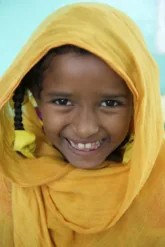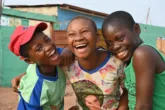Why we’re working together
UNICEF and AstraZeneca’s Young Health Programme (YHP) are partnering to raise awareness of the risks and effects of non- communicable diseases (NCDs) such as cardiovascular disease, preventable cancers and lung health conditions, among young people and key decision-makers. Today, countries are struggling to address the growing burden of non-communicable diseases (NCDs) – the number one cause of death worldwide.
Globally, 70 percent of all deaths, and 15 million premature deaths (at ages 30-69) are caused by NCDs – and 86 percent of these deaths occur in lower-middle-income countries. The World Health Organisation (WHO) has found that 70% of premature deaths from NCDs can be linked back to behaviours that first appear in adolescents.
“We believe in the power of young people to change the trajectory of the staggering burden of disease we face today, all over the world. Improving the health outcomes of future generations is a critical part of developing strong and stable healthcare systems, which in turn support sustainable markets and the economic prosperity of nations.” Pascal Soriot, Chief Executive Officer, AstraZeneca.
Become a corporate partner
What we’re doing
Working together, this partnership aims to galvanise a global advocacy movement to reach more than 5 million young people, train 1,000 youth advocates, and influence a minimum of 12 policies or laws around the world between 2021-2025. Our aim is to catalyse a global advocacy movement led by, and for, young people aged 10-24, to ensure that preventing NCDs is a government priority around the world, and to enable young people to live healthy lifestyles.
As part of our partnership, we are working in the following accelerator countries: Angola, Belize, Brazil, Indonesia, Jamaica, Papua New Guinea and South Africa.
What we’ve achieved
So far, the YHP-UNICEF partnership has directly reached over six-million adolescents and has indirectly reached over 46.2 million young people, meaning that over 55.9 million young people have unlocked progress towards SDG 3.4 (Figure 1) in the past three years.
In addition, the programme has trained more than 241,000 youth advocates, and influenced 16 policies and laws to be more protective of adolescent health and NCD prevention across six countries. Young people are at the heart of the partnership, which is empowering adolescents to advocate, influence policy, and demand accountability for issues linked to their own health and well-being, catalysing global change in the space of NCD prevention and contributing to the progress of the UN’s Sustainable Development Goal 3.4.
In Indonesia, 20 young advocates – including those from the National Children’s Forum, and adolescents with disabilities – influenced policy review and raised awareness about tobacco free environments, particularly in schools.
In Brazil, 1,127 young people joined together to agree proposals for the fifth National Conference on Mental Health, and 21 proposals were taken to the online national plenary as a result.
In South Africa, Young people co-designed an NCD communications campaign with representatives from the National Department of Health.
The Young Health Programme
AstraZeneca’s Young Health Programme (YHP) is a global philanthropic community investment initiative that aims to empower young people to make more informed choices about their health and catalyse a global, youth-led advocacy movement. It is active in 40 countries worldwide, combining community programmes, research, advocacy and supporting the development of young leaders, with a focus on vulnerable and under-resourced communities.
Through partnerships with more than 60 non-profit organisations including UNICEF, the YHP has directly reached more than 15 million young people and trained more than 580,000 youth as Peer Educators since its launch in 2010. In 2023, the YHP reached more than five million young people through prevention and education programmes.
The health and futures of young people must not be compromised by unhealthy lifestyles and behaviours. I am happy that UNICEF is joining a coalition of committed partners with the support of AstraZeneca to bring attention to NCDs which are now the world’s biggest killers.”






